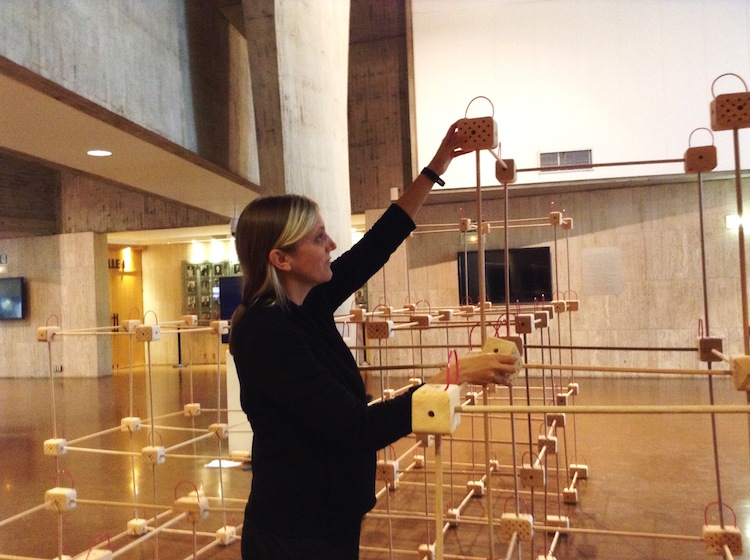
By A.D. McKenzie
PARIS (IDN) – Given the rampant technological changes taking place, it’s impossible to predict what the world will look like in even 20 years, and only the development of critical thinking and common civic values will help humankind to deal with the future.
That is the viewpoint of Sonia Dhillon Marty, head of a foundation that is seeking to “foster civic engagement” through art, architecture, design, sustainable farming and technology”, as she puts it. “If we are together, people will listen, politicians will listen,” Dhillon Marty said during a conference in Paris, September 12-13 at the headquarters of the United Nations Educational, Scientific and Cultural Organization (UNESCO).
The wide-ranging meeting – the fifth annual conference of the Dhillon Marty Foundation — brought together academics, professionals and young people to “investigate sustainable solutions for our interconnected world”, under the auspices of UNESCO.
This so called “State of the Community Conference: Every Decision Counts” followed the World Humanities Conference held in Liège, Belgium, in August where participants drew up a programme on the role of the humanities in contemporary society.
India-born Dhillon Marty previously worked in business development at technology company Cisco Sytems and she says she is concerned about getting youth involved in discussions about sustainability, especially as regards the Sustainable Development Goals (SDGs) adopted by the United Nations in September 2015.
“We need to focus on youth because they have more energy, and they will create the technology of tomorrow. We need to teach them to move above an individual culture to community sustainability,” she told IDN in an interview.
Each year, her foundation organizes a contest in which young people propose a phrase that reflects civic values, and the 2017 winning phrase (announced at the conference) was “Share Your Humanity”. This was submitted by a student at the University of Manchester in the UK – Zoe Van Schoor.
“In this golden age of technology, more and more people turn to Social Media to catch up with the breaking news of each day,” Van Schoor wrote. “However, today’s world is one in which we see the effects of Climate Change right on our doorsteps, and witness gross human rights violations carried out on the voiceless.
“Unfortunately, not all of their stories make it to our Facebook timelines and Twitter feeds. #ShareYourHumanity wants to change that. It wants all global citizens across the world to share their humanity from wherever they are, bringing attention to some of the world’s most underrepresented and hidden humanitarian crises,” she added.
Last year’s winning phrase was “every decision counts”, the title of the conference.
According to UNESCO, the “critical challenges facing our society” include the ”role of robots, artificial intelligence, the internet and biotechnologies” as well as “responses to extremism, discrimination and inequality”.
The conference aired diverse views on these topics, with some participants highlighting practical solutions.
Erin Moore, an architect and associate professor at the University of Oregon’s School of Architecture and Environment, used a UNESCO hallway to install a large structure for hosting bees.
Conference participants were invited to add pieces of paper with the names of people with whom they wanted to share the future, and, at the end of the conference, the installation was dismantled and 100 blocks given to participants to set up their own bee-nests, on balconies or in gardens.
Moore said that the installation, titled “Our Collective Future Project”, in collaboration with author and philosopher Kathleen Dean Moore, is a “framework made of nesting space for the larvae of solitary bees that houses the collective ecological future of the city as written in the futures of 100 individuals.”
She told IDN that she wants to raise awareness about how built environments often separate humans from other species, rather than working to embrace the richness of biodiversity and interaction.
In addition, her work centres on how built spaces can contribute to “environmental racism” and may reinforce hierarchies in ways that people are ignorant of, or sometimes prefer not to notice.
“How will we deal with transportation space, domestic space, restrooms . . . to offer access in the built environment that will bring everyone to the same level?” she asked.
“Restrooms are a lens through which we can measure how a community apportions dignity to its members,” she quoted at the conference, referring to the “separation of space according to race” in recent U.S. history and the current debate on gender.
“Human rights also benefit those whose rights are not wanting,” she added. [IDN-InDepthNews – 15 September 2017]
Photo: Prof. Erin Moore constructs a “future” home for bees during UNESCO conference. Credit: A.D. McKenzie | IDN-INPS
IDN is flagship agency of the International Press Syndicate.
facebook.com/IDN.GoingDeeper – twitter.com/InDepthNews











